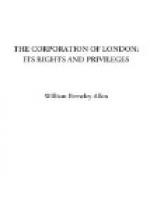The “complete” citizen may be defined as a ten-pound householder, paying scot and bearing lot. The freedom of the City is not, however, attainable by simple residence. It is to be acquired only by three modes—by patrimony, by apprenticeship, or by redemption. A royal charter, even, is insufficient to make the grantee free of the City. The freedom of the City is not confined to the male sex. Freewomen are called free sisters, but cannot transmit their freedom, which is, moreover, suspended during coverture. Freedom by service is acquired by a seven years’ apprenticeship to a freeman or freewoman, the indenture being enrolled at the Chamberlain’s office within twelve months of its execution. The apprentice need not necessarily be articled to a member of any guild, fraternity, or trading company, but he must not be the son of an alien. Freedom by redemption, or purchase, is of a threefold nature:—1st. It may take the form of a fine for any breach of the apprenticeship indentures; 2nd. It is often bestowed as an honorary distinction on individuals eminent for their public services; and 3rd. Admission to the freedom of the City is by presentment by persons entitled to confer that privilege. It is imperative on all persons elected to a corporate office, or “occupying premises and carrying on any trade, business, or profession, within the City and its liberties,” to become free of the City. This is done by the payment of the fees of the officers and of 5 pounds to the Corporation. The advantages of the freedom, though not so great in the present day as in ancient times, are still considerable. Besides being a bond of union and mutual protection, it entitles its possessor to a vote at the elections of the aldermen and the common council of the ward. Only freemen can act as brokers, or, indeed, carry on any trade within the boundaries of the City.
The Companies.
As the City of London waxed mighty and opulent, proportionate was the increase of the wealth and importance of its component parts. The humble guilds or crafts gradually developed themselves into large and influential trading companies, to belong to which was deemed an honour not beneath the consideration of royalty. Edward III., for instance, did not disdain to be enrolled in the Worshipful Company of Linen Armourers, now Merchant Tailors; and his example was followed by his successor, Richard II. The example, indeed, was contagious, for in the reign of the latter monarch the company in question could boast of the fellowship of four royal dukes, ten earls, ten barons, and five bishops. The custom has come down to our own times, and the proudest names in the aristocracy are recorded in the books of the City companies. The presidents of these crafts or mysteries were styled Wardens, who were assisted by a small number of delegates of the guild in presenting to the City Chamberlain all defaults against the rules and ordinances of the




